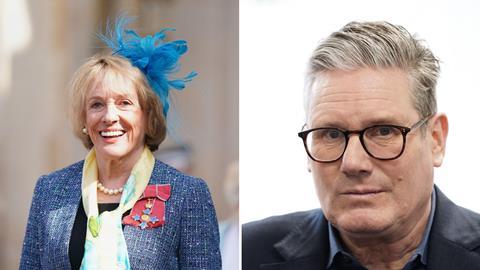In a recent conversation with Esther Rantzen, Sir Keir Starmer made it clear that he supported plans to legalise assisted dying in the UK. As a minister and the parent of a child with Autism, Sam Tomlin has serious concerns

A couple of weeks ago, Sir Keir Starmer, leader of the Labour party, met with Esther Rantzen. Rantzen has lung cancer and is campaigning for a change in the law to allow euthanasia (or assisted suicide). Starmer made his views clear: “I’m personally in favour of changing the law”, he told her. “Esther, I can give you that commitment right now.”
Public opinion also seems to be on Rantzen’s side. With the Campaign for Dignity in Dying reporting that 75 per cent are in favour of assisted dying, it may be a case of when and not if the UK follows countries like the Netherlands and Canada in legalising euthanasia (Greek for ‘good death’). The Scottish parliament is already preparing a bill to this effect.
Our lives are not our own and there is great freedom and peace to be found in that
My wife and I are Salvation Army officers in an area of high deprivation in Liverpool. We have seen the depths of the mental health crisis first hand and have counselled those with severe depression and suicidal thoughts.
We also have an autistic child. We are not naïve about the challenges that come with this. It has influenced many of our decisions, including the decision to home educate our three children.
All this gives me serious concern about public conversations on euthanasia that have been happening in recent weeks.
Making a moral argument
Proponents of a change in the law claim the moral case is overwhelming. None of us knows how we are going to die and while some may die tragically in a car accident and others may be ‘lucky’ enough to have a death our society deems dignified, others will experience agonising pain.
In the Netherlands, where euthanasia was legalised in 2001, there are criteria to safeguard against abuse. Someone seeking euthanasia must demonstrate cognitive ability, must show that their suffering is unbearable with no prospect of improvement and have medical professionals assess the application.
Those with concerns about euthanasia suspect that there is a more sinister underbelly to these arguments. Matthew Parris articulated this out loud in a column for The Times published on Good Friday (‘If Jesus submitted himself to death for the good of many, why can’t your Granny?’)
It is not a “bad thing”, Parris argues, that the terminally ill may feel pressure to “hasten their own deaths”. Indeed, it should be seen as a patriotic duty to take the “unspoken hint that everyone understands” as Western nations struggle with the cost of keeping people alive.
Far from shying away from a concept of human beings as disposable units in a market economy, Parris does not “apologise for [this] reductivist tone” because, “for a society as much as for an individual, self-preservation must shine a harsh beam on the balance between input and output”. Jesus may not be alive as far as Parris is concerned, but utilitarianism certainly is.
When I became a Salvation Army officer, I committed myself to caring for the poor, feeding the hungry, clothing the naked and loving the unloved. While not everyone who has sat with someone on their deathbed will oppose euthanasia, my experience thrusts me headlong into traditional Christian teaching, and away from arguments of utility. There is something holy about life - and dangerous about asserting our power over it.
Defining the good life
Parris and Co may think there is little difference between using medicine to prolong life and take it away but, as I have sat with those close to death, I have been struck by the goodness of the vulnerability and lack of choice it brings. “My times are in your hands”, says Psalm 31:15. “No one knows when their hour will come”, adds Ecclesiastes 9:12.
The difference, of course comes from a widely diverging conception of the good life. For Western liberals, it is a zero-sum game of pleasure and pain – once the balance is tipped, it might be time to go. If the Enlightenment project is focused on self-fulfilment and personal autonomy, submitting oneself to others - and ultimately to God – is nonsensical. But it reveals a central truth of Christianity: our lives are not our own and there is great freedom and peace to be found in that.
Writing for The Guardian back in 2013, Giles Fraser articulates this well. Like Fraser, I too, “want to be a burden on my loved ones just as I want them to be a burden on me – it’s called looking after each other. Obviously, I know people are terrified of the indignity of dying and of being ill generally…[because it] is a threat to our cherished sense of personal autonomy. But this is where the liberal model of individual self-determination breaks down. For it is when we are this vulnerable that we have little choice but to allow ourselves to be loved and looked after.”
So far, I can’t imagine liberals like Parris will be convinced. I wonder, however, if people are aware of how things have progressed in other countries. For Parris, the “strongest argument” of those he disagrees with is that “social and cultural pressure will grow on the terminally ill to hasten their own deaths.”
Slippery slope arguments are often dismissed in such debates, but the evidence suggests that, in countries where the law allows euthanasia, the slope really is very slippery.
Case study: the Netherlands
In the Netherlands in 2021, euthanasia and assisted suicide (EAS) accounted for 7,666 (or 4.5 per cent) of deaths. Life limiting conditions are not a pre-requisite for granting an EAS request. One study looking at the period 2012-2021 says: “the number of deaths through EAS for reasons other than terminal illness is increasing and not insignificant.”
Over three quarters of the cases in this study cited social isolation or loneliness as a major cause of suffering: “For patients with ASD [Autism Spectrum Disorder] in particular, their difficulty in making or coping with social contacts was a major factor.” It stresses that, while EAS is only permitted where suffering has a medical basis, there is a serious concern that intellectual disability is being accepted as grounds in itself: “The implicit message communicated to patients in granting EAS requests on the basis of intellectual disability or ASD-related suffering is that such conditions are indeed hopeless.”
No level of medical safeguarding will stop the tragedies that I have referenced in this article
Another study questions the definition of “unbearable suffering” as well as the influence of a physician’s own views, especially on patients with intellectual disabilities. More worryingly, the term ‘suffering’ was sometimes used “to describe the normal variations in behaviour and perceptions seen in people with autism spectrum disorders”.
In other words, “numerous reports…suggest that the lives of people with an intellectual disability are valued less across society, and that their short life expectancy results from inappropriate value-laden decision-making by healthcare professionals.” As the first study puts it: “This is of concern, as is the risk that the option of EAS hampers investment in appropriate treatments and societal changes.”
Looking to Canada
In Canada, a similar picture is emerging. The Medical Assistance in Dying law (MAID) legalised euthanasia in 2016. Episcopalian minister Benjamin Crosby wrote an exposé of the churches’ complicity in what has become the sixth most common form of death in Canada, outlining how disability rights groups warned that the law would extend beyond provision for those who are terminally ill – something which came to pass when a more expansive MAID law was passed in 2021. People nowhere near death can now legally seek euthanasia.
British advocates for a change in the law suggest that safeguards will be so stringent that only those who demonstrate a consistent desire to end their life will be able to do so, and there is no question that it will be used to coerce people or divert energy away from making society a better place. As Crosby outlines, however, this has not been the case in Canada:
Sophia, 51, suffered from multiple chemical sensitivities (MCS). While MCS is difficult to manage, symptoms can improve significantly with decent housing. “The government sees me as expendable trash,” she said in a video a few days before she was killed via MAID in February 2022.
Denise, 31, was pursuing MAID for similar reasons until a GoFundMe campaign bought her some time. But if she cannot find affordable housing going forward, she may still end up dying by euthanasia.
Kat, in her late 30s and with a genetic disorder, cannot afford her treatments. “I feel like I’m falling through the cracks so if I’m not able to access health care, am I able to access death care?” she told CTV News. She has been approved for what she calls an “open invitation” to go through with MAID at any time.
Recently, a Canadian judge ruled that a 27 year old autistic woman would be allowed to seek MAID despite the protestations of her parents. Preventing a medically-assisted death would cause her “irreparable harm”, the judge asserted. As in the Netherlands, being autistic is reason enough for the state to agree to kill you.
Eugenics on the rise
Without over-stating the matter, I am convinced that the introduction of euthanasia in the UK will usher in a new form of eugenics. As author and mathematician Carlo Lancellotti put it on X: “Let me be blunt: anybody who looks at the fiscal and demographic situation of Western countries and does not understand that assisted dying will be aggressively promoted to cull the weaker segments of the population, save money and reallocate health resources is a complete fool.”
As a parent of an autistic child, this terrifies me. Autism does not inevitably involve suffering, but our society can make it harder for autistic people to thrive. Our child lives a full and beautiful life, and continues to teach us more about what it means to be human.
There is something holy about life - and dangerous about asserting our power over it
Theologian Brian Brock explains that the problem with the “medical mode” of disability is that it is framed in a world view where self-sufficiency and independence are valued above interdependence and needing others. No amount of drugs can solve isolation and loneliness, it is a symptom of a society in which the only option is seen as state-sponsored suicide.
Arguments around personal autonomy are complex for people with intellectual disabilities, and advocates for euthanasia will point to the injustice of not allowing people to have a say over their own lives. But it seems clear from the evidence that no level of medical safeguarding will stop the tragedies that I have referenced in this article.
Transforming hope
The scandal of the Christian gospel is that there is no person or situation beyond redemption. Countless stories in the Church point to people’s lives being transformed against all hope. People who would almost certainly have killed themselves if euthanasia was legal are now living fulfilled lives in the context of interdependent community and fellowship.
Does this mean everyone who walks into a church finds peace and hope? Of course not. Sometimes the Church can be part of the problem. But the day I stop believing in God’s transformation of any situation will be the day I hang up my Salvation Army uniform.
In these times, the church in Britain would do well to heed the warning of theologian Stanley Hauerwas: “If, in a hundred years, Christians are identified as the people who don’t kill their children or kill their elders we will have done well.”



































3 Readers' comments